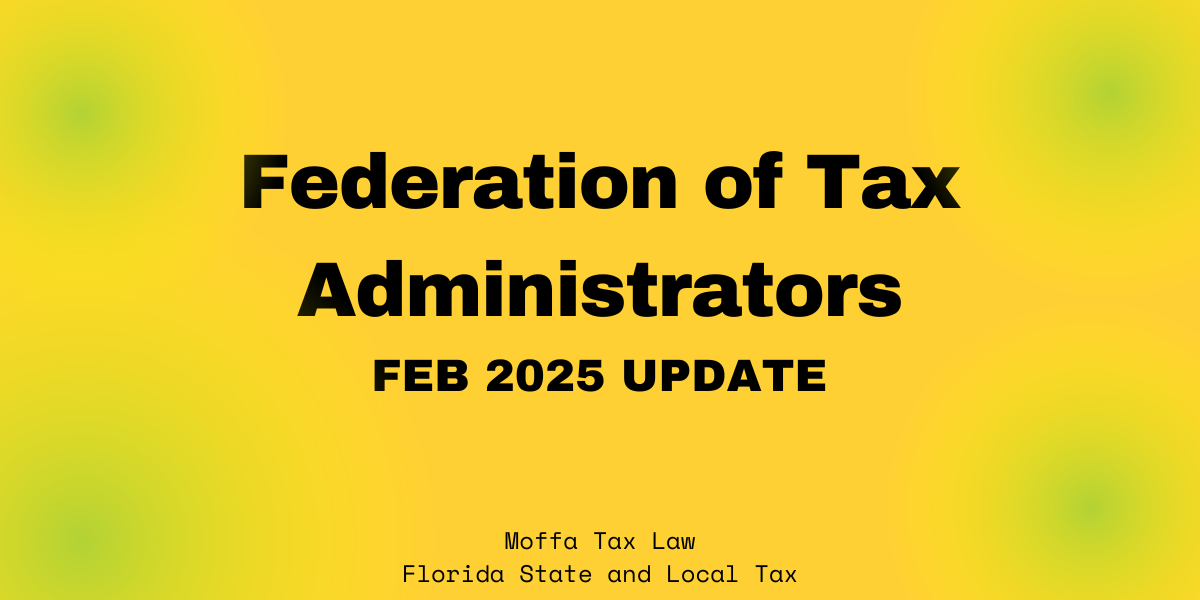NEWS & INSIGHTS


The Federation of Tax Administrators (FTA) plays a critical role in coordinating and informing state tax agencies on emerging policy, administrative challenges, and enforcement strategies. In its latest committee report, the FTA highlighted key activities, including updates on state tax department transitions, federal monitoring efforts, and upcoming conferences relevant to tax professionals and policymakers.
With changes in state tax leadership following the 2024 elections, ongoing federal tax developments, and upcoming industry events, the FTA report provides an overview of the evolving landscape in state tax administration. This article breaks down the key takeaways from the FTA’s latest findings.
Key State-Level Leadership Changes
One of the significant updates in the FTA report relates to state tax department leadership transitions following the November 2024 General Election. The report outlines several key departures and appointments across various state revenue departments:
- Indiana: Bob Grennes retired as Commissioner of the Indiana Department of Revenue. No successor has been announced.
- Missouri: Wayne Wallingford was succeeded by Trish Vincent as the new Director of Revenue.
- North Carolina: Commissioner Ronald Penny retired, and Wolford McKinley has been appointed as the interim Commissioner pending confirmation.
- Vermont: Craig Bolio resigned to take a Deputy Commissioner role in Massachusetts. No successor has been announced.
These transitions highlight ongoing shifts in state tax leadership, which could lead to policy changes and adjustments in tax enforcement strategies.
Federal Monitoring Efforts and Impact on States
The FTA continues to monitor federal tax policy and its implications for state tax administration. The report does not specify particular legislative initiatives but emphasizes that federal tax policy decisions will directly impact how states administer their tax laws.
Several ongoing federal-level tax discussions could affect state tax compliance and administration, including:
- Potential changes to federal tax rates or deductions that could influence state revenue streams.
- Interstate commerce and tax nexus debates, particularly concerning remote work taxation and sales tax collection for out-of-state businesses.
- IRS enforcement priorities that may trickle down to states, particularly in areas such as pass-through entity (PTE) taxation and compliance efforts for large businesses.
With federal policy still uncertain, the FTA’s role in tracking developments ensures that state tax agencies remain prepared to adjust their tax policies and compliance mechanisms accordingly.
FTA Compliance Workshop and Commissioner Summit
The FTA continues to provide educational and networking opportunities for tax professionals through its annual conferences and regional meetings. According to the report, the FTA Compliance Workshop and Commissioner Summit held in December 2024 in Palm Desert, California, was a success, drawing over 300 attendees.
Looking ahead, the FTA has announced several upcoming conferences of interest, including:
- FTA Annual Meeting: June 8-11, 2025, in Chicago, IL.
- SEATA (Southeastern Association of Tax Administrators) Regional Meeting: June 6-9, 2025.
- NESTOA (Northeastern States Tax Officials Association) Regional Meeting: September 24-27, 2025, in Philadelphia, PA.
- MSATA (Midwestern States Association of Tax Administrators) Regional Meeting: September 7-10, 2025, in Oklahoma City, OK.
- WSATA (Western States Association of Tax Administrators) Regional Meeting: October 26-29, 2025, in Albuquerque, NM.
- FTA Compliance Workshop: November 28-30, 2025, in Jacksonville, FL.
- FTA Commissioner Summit: December 1, 2025, in Jacksonville, FL.
These conferences provide key opportunities for tax professionals, policymakers, and state officials to discuss best practices, emerging tax issues, and compliance strategies in a rapidly changing tax environment.
Conclusion
The FTA report underscores the importance of state tax leadership transitions, federal tax monitoring, and industry engagement through conferences and workshops. As state tax agencies adapt to changing policies and administrative challenges, the FTA’s work in facilitating discussions and providing strategic guidance will continue to be valuable.
Key takeaways from the report include:
- State tax department transitions following the 2024 elections will likely impact tax policy and enforcement strategies.
- The FTA remains focused on tracking federal tax policies and their implications for state tax systems.
- The FTA Compliance Workshop and Commissioner Summit drew strong participation, and upcoming events will provide further opportunities for state tax professionals to engage with emerging issues.
For businesses and tax professionals, staying informed about these developments is critical to navigating the evolving state tax landscape effectively.
Share
Additional Articles by the SALTy Orange at Moffa Tax Law:
NEWS & INSIGHTS Inside the FTA’s May 2025 Committee Report: What State Tax Officials Are Watching Inside the FTA’s May…
NEWS & INSIGHTS State Conformity with the BBA Partnership Audit Rules: Where Are We in 2025? State Conformity with the…
How Florida’s Sales Tax Auditors Target Convenience Stores (and What You Can Do About It)”
NEWS & INSIGHTS How Florida’s Sales Tax Auditors Target Convenience Stores (and What You Can Do About It) Florida Department…

Jeanette Moffa, Esq.
(954) 800-4138
JeanetteMoffa@MoffaTaxLaw.com
Jeanette Moffa is a Partner in the Fort Lauderdale office of Moffa, Sutton, & Donnini. She focuses her practice in Florida state and local tax. Jeanette provides SALT planning and consulting as part of her practice, addressing issues such as nexus and taxability, including exemptions, inclusions, and exclusions of transactions from the tax base. In addition, she handles tax controversy, working with state and local agencies in resolution of assessment and refund cases. She also litigates state and local tax and administrative law issues.


